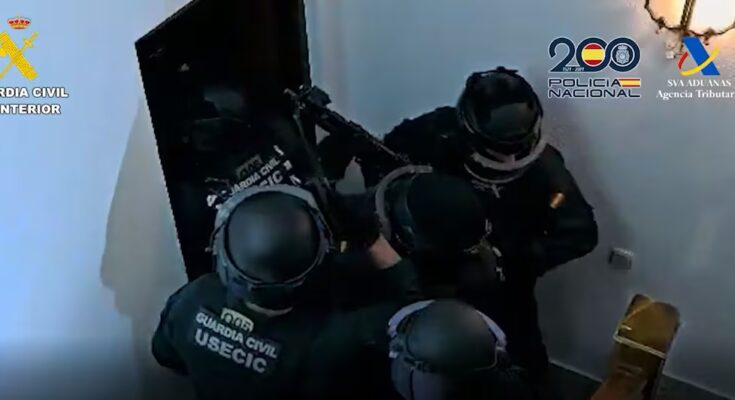National Police officers, in a joint operation with the Civil Guard and the Deputy Directorate of Customs Surveillance, dismantled a criminal organization that smuggled drugs through Madrid-Barajas airport with fake travellers, explains a police note sent this Friday. 16 people who had a clear distribution of duties, including airport employees, were arrested. Investigators managed to seize 60 kilos of cocaine, five million euros, a pistol, a repeating rifle, a grenade launcher, numerous cartridges, almost 100 detonators, two vehicles and 10 mobile phones. The individuals involved in this network are accused of crimes against public health, membership of a criminal organization, money laundering and illicit possession of weapons and explosives.
To transport the narcotic substance out of the airport facilities, this criminal network made use of staff who took advantage of their status as airport employees with limited access to the premises. The investigators carried out a total of five inspections and searches in three homes and two warehouses, in which they seized more than five million euros, a pistol, a repeating rifle, a grenade launcher, numerous cartridges, almost a hundred detonators, two vehicles and 10 mobile phones.
The investigation began in October 2022 with the seizure of several backpacks containing between 10 and 14 kilos of cocaine from several foreign airports, where several people were detained. In 2023, bags containing more than 40 kilos of cocaine were again intercepted, which made agents think they were dealing with a sophisticated organization, specialized in large-scale drug trafficking and with a well-established logistical and international structure.
During the three-year investigation, it was established that this criminal organization maintained an operational structure with a clear distribution of functions for each of its members. On the one hand, the leader was the “chiever,” who served as the nerve center of the network, integrating and connecting each cell through strategic decisions. He maintained contact with each link in the chain, ensuring the correct functioning of the framework. He was in charge of implementing the strong security measures adopted in the reception and transfer of drugs, as well as being the weapon of the members who made up the operational structure within the airport complex, the note specifies.
Fake passengers
The criminal network had “rescuers” operating inside the airport. They acted like alleged passengers who accessed the airport using the boarding passes of low-cost domestic flights in order to reach the international arrivals hall. On the baggage carousel there were suitcases hiding large quantities of cocaine. They removed the tag that allowed their identification and left the customs area pretending to be travelers coming from domestic flights.
The “porters” also participated, workers from the various companies located in the airport area, who facilitated the entry of the drugs, with a crucial role in the exit of the goods.
Additionally, another member acted as a frontman, receiving financial compensation from both the leader and the international organization for tasks such as renting or purchasing vehicles and property in his name, covering up the illicit activities of other members of the organization. The figurehead was also in charge of supplying weapons and ammunition, police sources said.
Bleach
The organization had one person responsible for laundering money through a network of companies. He held the role of administrator and had a physical office that had the leader as an employee to justify and give an appearance of normality to his standard of living. Furthermore, he diverted the money to bank accounts in foreign countries, to which he often traveled, and took the money out of circulation using virtual currencies.
The investigations culminated last May with the entry and search of three homes and two warehouses. One was a kind of nursery in the municipality of Sonseca, in Toledo, where agents seized 25 kilos of cocaine.



